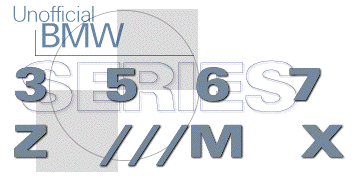|
Ron Stygar Carl Buckland Dale Beuning Forums Help
Date: Fri, 15 Mar 1996 10:21:43 -0500
Kevin Moak, BMW 750i owner asks: Here is my '88 M5 specific answer based on what I've read, and of course, my personal opinion. Engine:Mobil 1 15W-50 4,000-5,000 mile change (Switched to synthetic this fall so haven't changed it yet) Castrol GTX 20W-50 3,000 mile change or just before driver's schools (Before synthetic) Any name brand regular (dino) or synthetic oil works fine. The most important point is change intervals. The ideal change interval depends on your driving habits. Two thousand miles of short trips is a lot tougher on oil than a quick trip to Florida and back. I try to avoid short trips in the M5 -- my wife's Ford Taurus station wagon gets most of the short trips. Both cars get the oil changed at the same interval, but the Ford takes much more short trip abuse. Its oil needs changing at 3,000 miles, while the M5 could probably go much longer. An oil analysis is the best way to determine oil change intervals, but that's too much effort for me. The BMW service lights are probably the most practical way to judge oil wear because they factor in the way the car is driven. My oil change light just turned yellow after 9,000 miles. I've been changing it every 3,000 miles, so I'm much more conservative than the lights.
Maybe change your oil based on the service lights and what makes you
comfortable (e.g. when the lights are halfway). Your comfort level is
probably similar to mine because our engines are so expensive. Factory
rebuilt M5 engines are $17,000. I'm sure your 12 cylinder engine is
also very expensive. Ford Taurus engines are probably cheaper than
brake calipers for an M5.
Three engine temperature points determine a cold, warm, or hot engine.
Below 4000 rpm (engine wear miles):
Above 4000 rpm (engine wear miles): About 10,000 "engine wear miles" before the yellow light.
(Note: E28 M5s have five green, one yellow, and one red light, so
about 2,000 engine wear miles for each green light)
Practically speaking, regular oil is fine here in the Northern Virginia area because the temperature isn't extremely cold or hot. My engine definitely cranked easier this winter with synthetic, but it's not a big deal if you take it easy when the engine is cold. I also do driver's schools that put high temperature, high rpm stress on the engine. Fresh regular oil is also fine for high rpm performance driving, but synthetic seems to have a performance edge. 2. No downsides beside cost, unlike some additives (e.g. Slick 50 which, best case, does nothing and, worst case, clogs small oil passages). 3. Less frequent oil changes balance some of the increased cost (regular oil is still a better "value" based on my oil change intervals). Synthetic oil is about four times as expensive ($1.xx vs $4.xx). I do my own oil changes. My time is worth something, plus the pain of recycling the oil. 4. Because I'm now convinced that synthetic oil is somewhat better performing than regular oil (not necessarily a better dollar value), it makes me feel better. Honestly, this peace of mind, may be my most important reason. 5. Even though Redline synthetic oil is repeatedly recommended as the best, I haven't read anything to convince me that it's any better than Mobil 1. Plus it's twice the price per quart ($8 vs. $4 for Mobil 1). Transmission (manual):Redline MTL, SAE 75-80 synthetic, non-hypoid API GL-4, 30,000 mile change. Synthetic oil helps manual transmissions shift _much_ better when cold (highly recommended). BMW recommends Mobil SHC 630 synthetic, SAE 80 non-hypoid API GL-4 gear oil, or a single grade 20/30/40 API-SE/SF regular motor oil. Gear oil viscosity is measured at a lower temperature than motor oil. That's how a much lower viscosity motor oil can be used in place of a gear oil with a higher viscosity rating -- they work out to about the same viscosity at equal temperature. Differential (limited slip):SAE 90 regular, hypoid API GL-5, limited-slip additive, 30,000 mile change. Differential gears need very high pressure wear protection oil (hypoid). High sulfur content -- you can smell the difference. Limited-slip additives provide smoother take-up and prevent shudder. Brakes:
Brake fluid needs to be changed for two reasons, maintenance and performance (it takes about a quart to flush the system). Maintenance - changing old brake fluid removes water from the brake system. Brake fluid is hydroscopic, it absorbs water. Old brake fluid must be flushed out or water absorbed by the fluid eventually causes internal rust on the disk calipers and pistons.
Performance - changing old brake fluid helps high temperature
operation because fresh (dry) brathan older (wet) brake fluid. If brake fluid boils, compressible gas
bubbles form, resulting in a very spongy brake pedal.
DOT 3 DOT 4 DOT 5
----- ----- -----
Dry Boiling Point 401F 446F 500F Wet Boiling Point 284F 311F 356F The DOT 3 and DOT 4 specifications are for glycol based (regular) brake fluid, while DOT 5 is for silicone. Silicone DOT 5 is not compatible with the ABS hydraulic control unit because it doesn't lubricate the ABS pump like glycol based fluid. Silicone is slightly more compressible than glycol fluid. It has a higher wet boiling point because it doesn't absorb moisture like glycol fluid. This lack of moisture absorption causes problems when water gets in the brake system. Instead of mixing with the brake fluid (so it can be flushed out easily), the moisture gets trapped at low points in the system and causes rust. Hope this helps, Pete Read |

